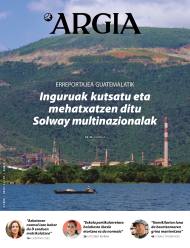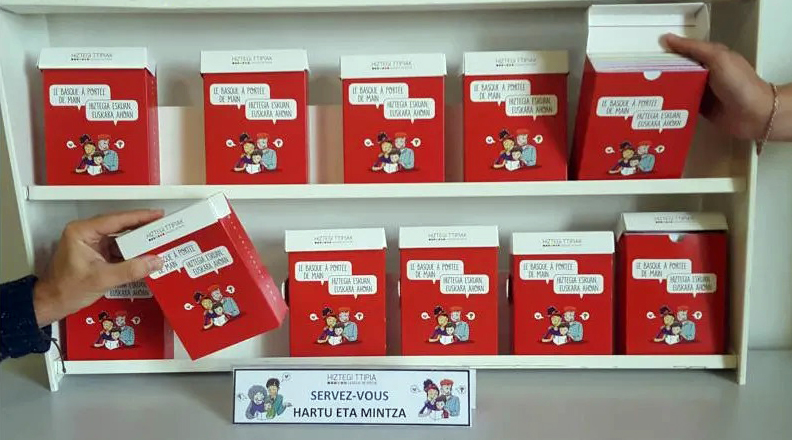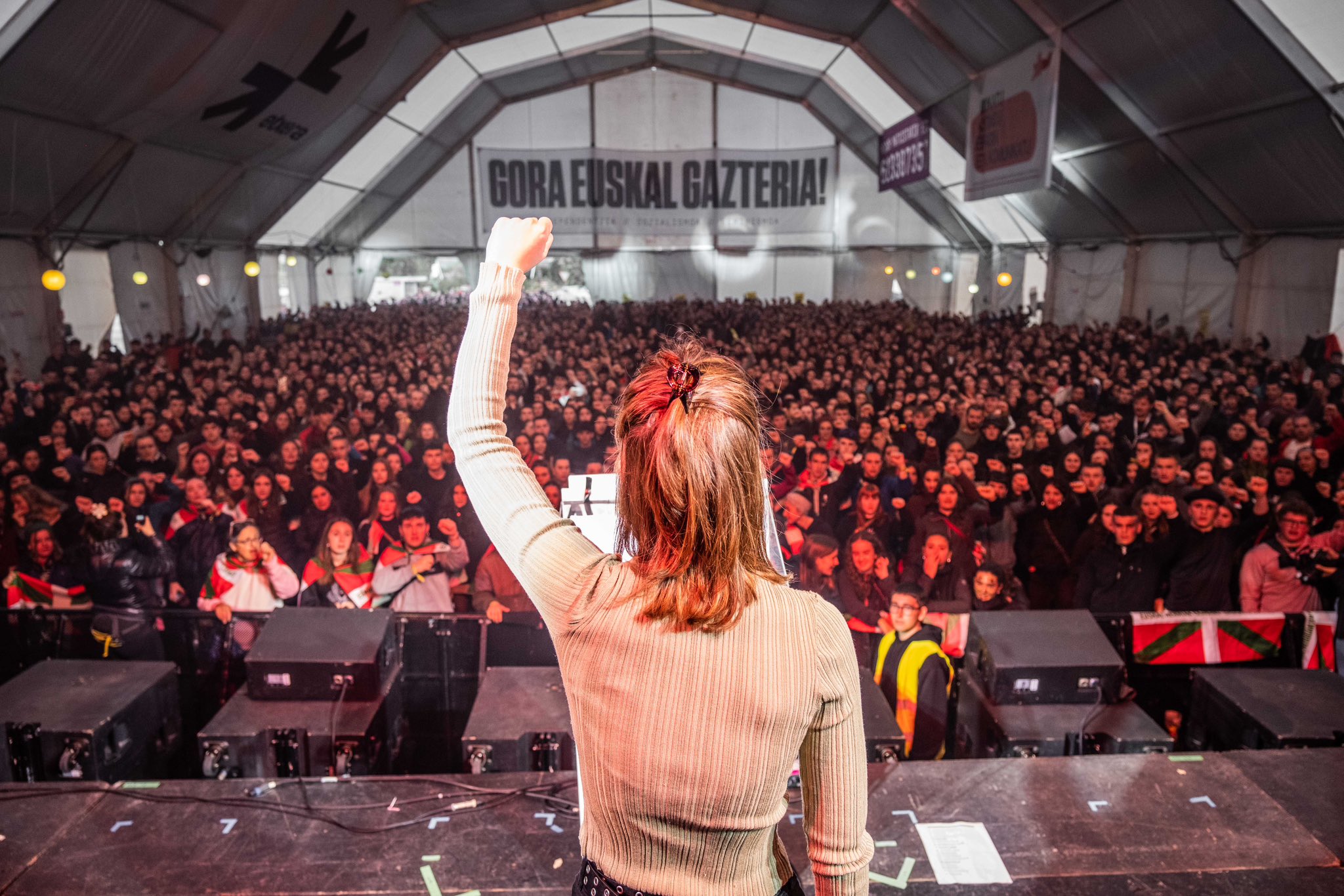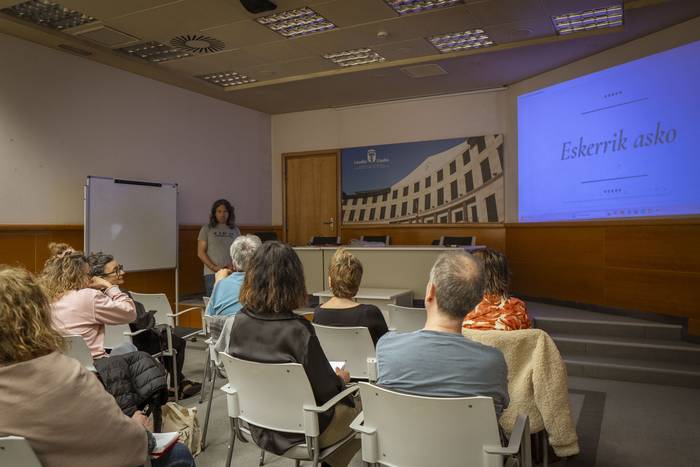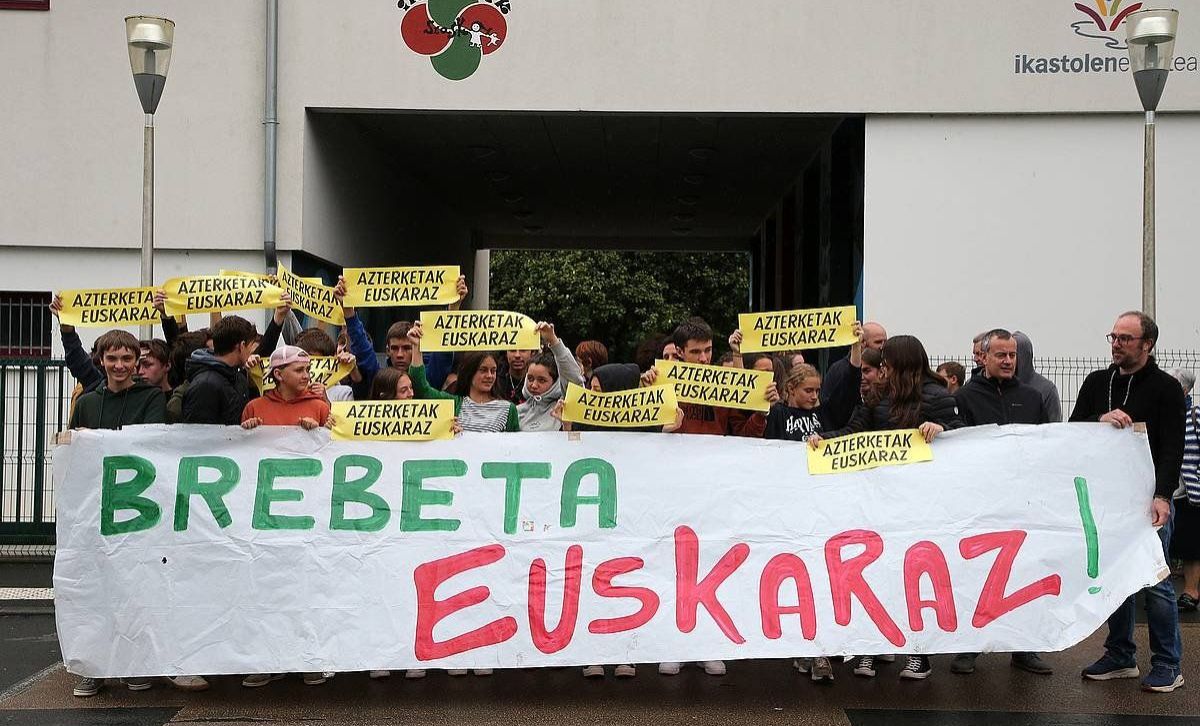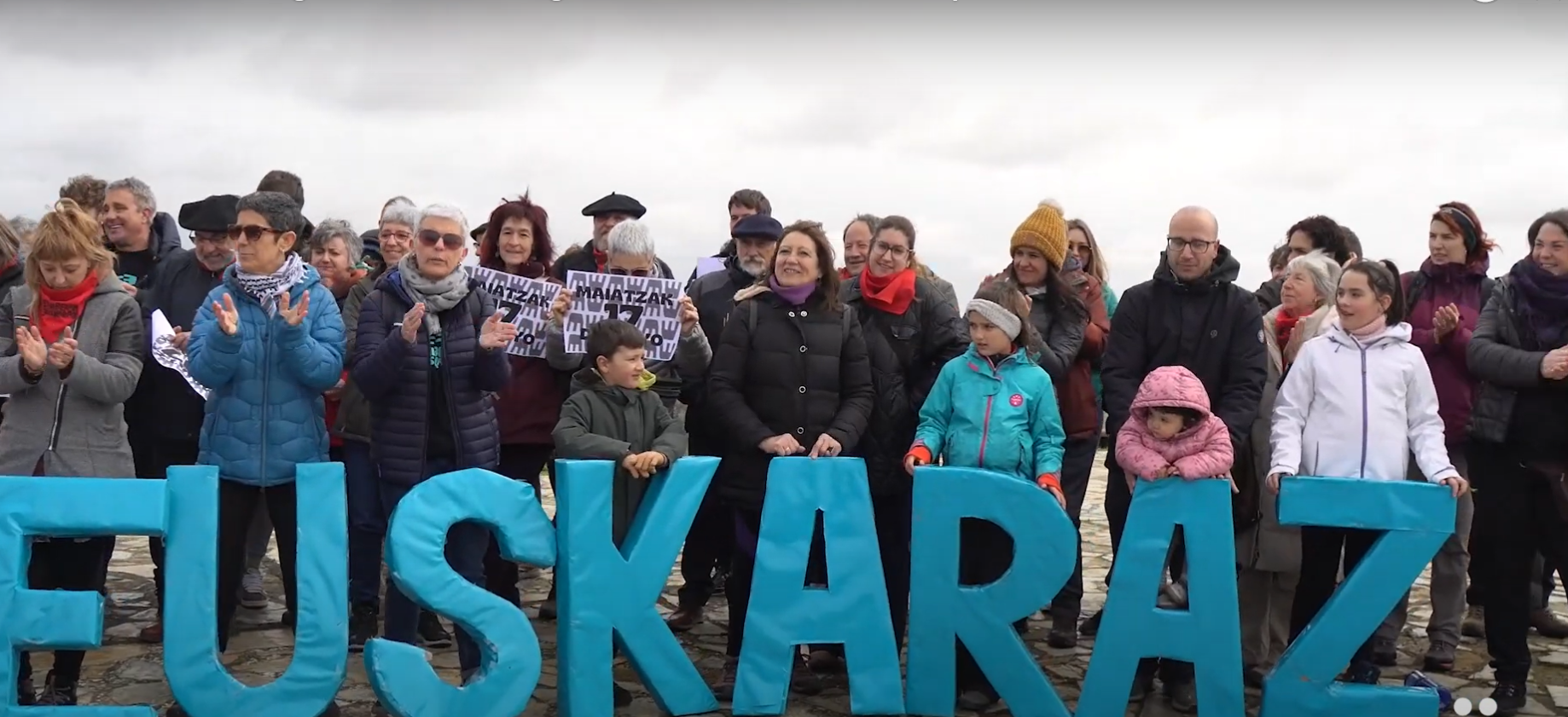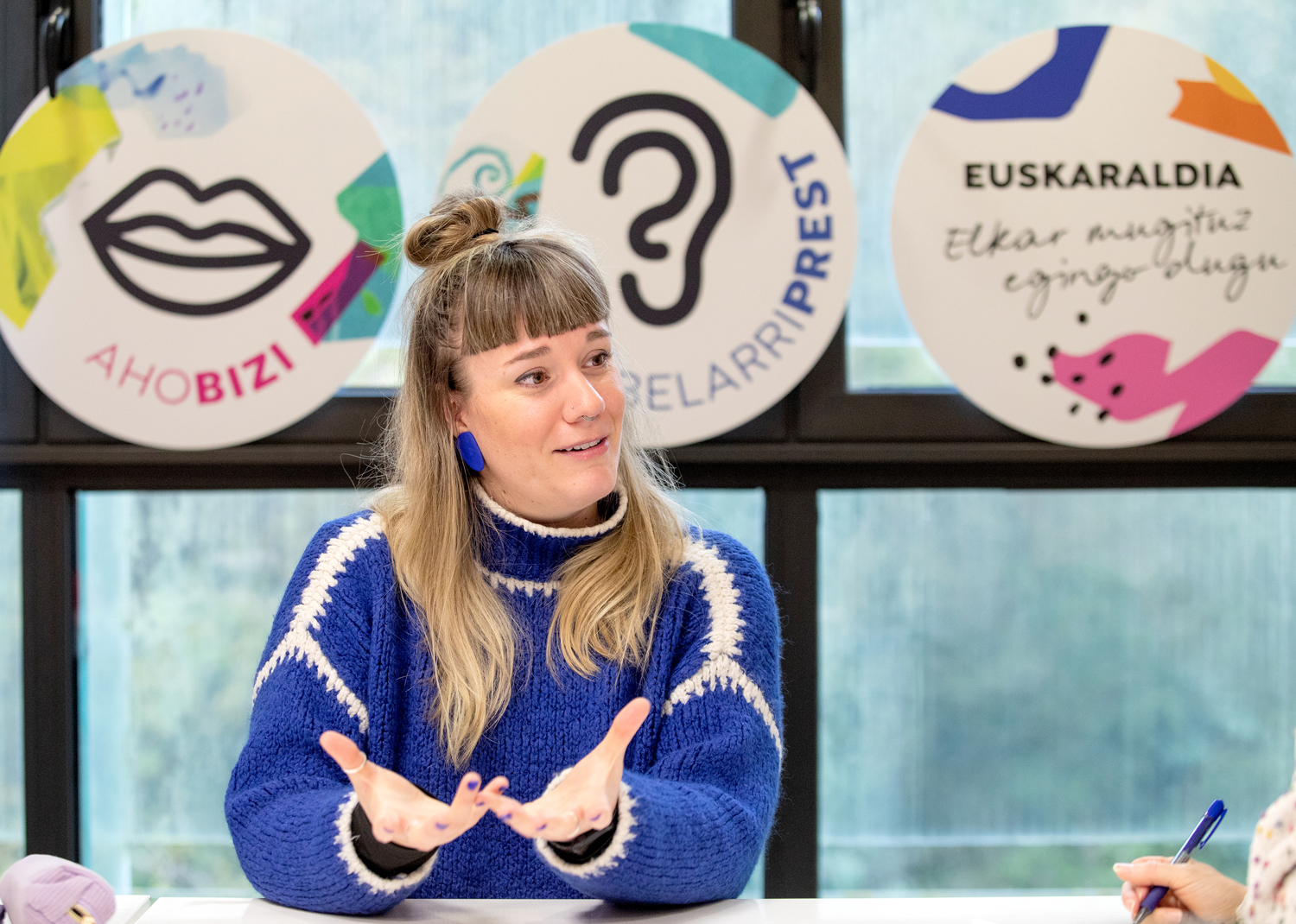"I want to know how to undo indifference to the Basque Country"
- In 2022 I met for the first time with Cristina, in the framework of the project Democratic Management of Diversity in Navarra organized by Eusko Ikaskuntza. We discussed the issues that brought us together and separated us by eight young people who represented the socio-political reality of Nafarroa Garaia. Cristina was the one I learned the most in those days.

Where have you come from?
Our house has always been a very political and militant house. When I came from Peralta to Pamplona at the age of 18, I had the opportunity to dedicate in many ways all that energy and interest. Having been educated in a militant context has made me feel like taking responsibility altruistically and linking life to political and social projects.
At the university stage I focused differently: I was immersed in the student movement, I coordinated at the state level, the strikes of the feminist movement also arrived… I understand that other young people have put their energy into projects related to cultural or artistic development, but I wanted to be on the street.
More cultural was the militancy that I knew about the Basque Country, that of Peralta: The people back from the Olentzero Association and the fathers and mothers with sons and daughters enrolled in model A. I didn't consider myself Euskaltzale, because I didn't know what it was like to be Euskaltzale. But I felt that the legitimacy to make any kind of claim in favor of the Basque country also belonged to me.
What was the quality of the struggle for Euskera that did not motivate you to participate in it?
I think it's more related to my context. I am a young working-class woman and that is what has conditioned everything. I didn't understand the issue of Euskera as a priority when I was younger, I didn't feel it as a matter of bringing all my energy into it.
Later came the connection with the Euskaltzale movement. Jon Zapata, a colleague of the UPNA, sometimes incited me to the issue and when he contacted me from Euskaltzaleen Topagunea, began the process of reconciliation with my Basque. I have reconciled him because the experience I had at university made me feel that it was not useful for this struggle, that I could not contribute because I did not know Euskera and, in addition, I was doing nothing to learn. By some profiles I did not see myself legitimized and I decided to go.
I started to get in my head after that experience that I had at the Topagune in 2021 and since then the issue has been cross-cutting in my life. This year I have chosen to enroll in the Basque Country.
What motivates you today?One of the things that
moved me away from that struggle is what motivates me the most today: cultural. What motivates me the most is the possibility of accessing certain public spaces in Basque.
I am also referring to another fundamental issue relating to legitimacy. As I said, I'm a woman and a young man, and that goes through me altogether. I seek every moment legitimacy in all areas of my life. Legitimization and recognition. Valuation, that's the word. I can't deny it even if I like it.
Every time I move in favor of the Basque Country, some friends around me tell me that “Cris, all right, this contribution was necessary.” Thank you to them!
Who, in that sense, is your authority?
I have thought a lot about it and I have not identified one person or another, but I believe that some specific entities or sectors have greater resistance to the opening of the Basque community. Maybe discursively.
As for the steps to move forward in non-Basque areas, I have made much harder contributions than the Basque communities. Around that, for example, it would be much harder in the conclusions of the latest diagnoses made by the Euskaltzaleen Topagunea. If we want to make progress on the road to guaranteeing linguistic rights, we must go down to the sludge in the Bank.
To see, I am interested in getting down to the barros.TodavI have not developed the issue of mud all that I have wanted and I feel that in all places I am saying the same thing, but I believe that we must set
objectives that are adapted to the local reality, that give great importance to the social environment, which is the one that will adopt in the day of tomorrow one or another attitude towards the Basque. Many times you can't go with language rights discourse everywhere, because people get bored. Sometimes not even with the argument of being an indigenous language.
Pamplona is, in part, a sign of the polarisation of Navarre society. Some spaces are one another, and that is respected. But I think the two sides are not really known.
Can you call it respect?
That's what some people understand, but actually neither field really knows the other. Here, those in both areas have the possibility of developing themselves educationally, socially and culturally, and that's what I call mutual respect. That is, that each person has his economic conditions and possibilities, he can develop his life in whatever direction he wants, and that is a reality [in Pamplona].
I know that Euskaldunes still do not have their linguistic rights guaranteed in public services, that the struggle of children’s schools is also underway… But both the Basque and Castilian communities have the opportunity to develop within normal conditions and have guaranteed minimum standards.
By pulling the coexistence, the members of a community are able to adapt to the forms of another community. On the contrary, no.
How?
The linguistic option is conditioned only by monolinguals.
I don't mean that. What I mean is that our social environment educates us and that that social environment has rules. If you have been educated in an Euskaldun environment, you have a cultural, social and militant context. And if you've studied in a concerted Church school, another one. What I am saying is that everyone is allowed to develop as he can. But here there is no real problem of coexistence beyond these legitimate complaints that the Basque community can make.
But, then, only some make coexistence possible in this sense.
Yes, and there the Basque community is always going to lose. But the Basque community is very strong here and has the capacity to develop its own structures, because these practices are spreading more and more.
The point is that, going back to the mud, in the Ribera there are no such two groups, there is no capacity to develop one of them. When I listen to some of the approaches that are being made in favour of the Basque Country, it seems to me that they are made without regard to local realities.
When there is a clash between these two communities, if we are talking about institutional protection, there will always be a Basque loser. But in Pamplona the Basque community is very proud and very strong and vindictive. That is what must be broken in the Bank. The capacity of the Basque community to develop elsewhere and to create its own infrastructures in the Bank will not be until 40 years from now.
That is why the institutions are required.
Yes, I understand. But when we talk about priorities, I cannot allow the process of Euskaldunization of the population of the Ribera to be perceived as a linguistic confrontation.
Of course.
[Laughter]. I believe that if I am able to hold a conversation in Basque in four years, so that I can be in the spaces that I want to be and to achieve the legitimacy that I want to achieve, I have already done what I have to do. For me, language change will never be a problem, I have never experienced the feeling of having to give up some principles. What happens is that bringing that speech to my people is extremely complex to me.
Why should we go down to the mud of the Ribera, down the emotional path or down to linguistic rights?
I think both things are needed. There are no magic buttons. Look, with the project that the Laba association of Pamplona has with the migrants I felt a great empathy. A phrase by Yasmine Khris on behalf of society was recorded in my memory: “We want to convey that Pamplona is more fun than Pamplona.” For me, it was like going back to childhood. The Basque was fun, innovative, progressive, very cool and very different from the rest of what was done at school, key to another world.
But how does it get here? I think there are two fundamental pillars. On the one hand, we need objectives adapted to the local reality, understanding that we have a very different relationship with the Basque people. On the other hand, it is not that the Basque people here have less ambition, but that we have learned to live the Basque country claiming its existence.
What is the priority at the moment?
We have to resort to 30% of the Navarre society which is not in favour of or against the Basque people. It is not possible that a large percentage of the population is not interested in the movement generated by this passion. In addition, that 30% who are against the Basque Country will never position themselves in favor, and I do not want to play with anyone who says “that the Basques come”, I am not interested in these people.
My priority is not for people to understand that I have the right for the Peralta doctor to attend me in Euskera; the first thing I want is that within the normality of Peralta the enrollment of children in model D should be seen. And by that I don't mean that I don't see that demand for public services as reasonable, but I can't start out there.
I have always heard you in favor of the model A.La seed is model A, but at the same time model A
can produce frustrated children. Since model A does not Euskalduniza – and therefore these children do not know Euskera well – it is possible that boys and girls reproach their parents who do not register in model D. Model A is fundamental in places where Euskera does not yet have legitimacy, for people who do not see Euskera as theirs.
That is very clear. In the villages that take Olentzero out into the street at Christmas, the involvement of the parents of model A is usually greater, then the Basque Days have arrived and then model D. After all, I believe that, AMETS, the people who wager on the Basque people in those places have to make a greater effort than the rest of the citizens to bring people closer to the Basque people, and they have to give up a few things. We have to go slower, there is no other option in the Ribera.
What do you see in your contribution?
When I think about concrete people in my environment, I feel that my job is that their children, if they do, enroll in model D. How am I going to do that? How am I going to sell that? Many times I don't know what arguments to use. Of course, I have to explain that Euskera does not take anything away from you, which is nothing more than add.
I would like to put the issue of Euskera in the centre of the Bank so that the linguistic rights of the Basque community may be extended, but I have no interest in this debate in the Bank being placed within the framework of linguistic rights, because people do not care about that.
I've often heard you talk about the democratization of Euskera. What is that? Everyone should have the opportunity to learn Basque and
be an Euskaltzale environment. That's why I'm so focused on local projects. Many people have been working very fine for years, Errigora is the clearest example. They do an impressive job and I have no criticism of that work model, but it is a practice that reaches a sector of society.
For me it is a democratisation that in Nafarroa Garaia everyone has the opportunity to become aware of the importance of the Basque country. In any case, there is no doubt that the administration must also be required to take decisions. The promotion of volunteering by public institutions for the learning of Euskera is not a linguistic policy. It can be a promotional or awareness-raising campaign, but never a real commitment to transforming socio-linguistic data.
What does all of your militancy fields contain?
I've always wondered why people think what they think, why it's where it is. In college, I didn't understand why people didn't militate in the student movement. Now, from other perspectives and from other spaces, my obsession is to understand where each person is part in the Basque theme. I want to know how to undo the opposition to the Basque country, but above all, I want to know how to deconstruct indifference.
I don't know if you want to add anything.
One last thing, yes. I have thought a great deal about what my contribution can be in the debates on the Euskaldunisation process, and I often feel repetitive about the Ribera issue and the setting of objectives.
In this debate on the Ribera, my job is not to ratify and legitimize the practices and speeches that the Basque community has always had. I would like to add other points of view, and with them to speed up the process of Euskaldunisation.
I try to understand why my environment is not betting on the Basque and, above all, why the Basque is indifferent to 30% of the population. Perhaps because there are outdated practices and speeches.
Antton Kurutxarri, Euskararen Erakunde Publikoko presidente ordearen hitzetan, Jean Marc Huart Bordeleko Akademiako errektore berriak euskararen gaia "ondo menderatzen du"
You may not know who Donald Berwick is, or why I mention him in the title of the article. The same is true, it is evident, for most of those who are participating in the current Health Pact. They don’t know what Berwick’s Triple Objective is, much less the Quadruple... [+]
Is it important to use a language correctly? To what extent is it so necessary to master grammar or to have a broad vocabulary? I’ve always heard the importance of language, but after thinking about it, I came to a conclusion. Thinking often involves this; reaching some... [+]
Adolescents and young people, throughout their academic career, will receive guidance on everything and the profession for studies that will help them more than once. They should be offered guidance, as they are often full of doubts whenever they need to make important... [+]
Maiatzaren 17an Erriberako lehenengo Euskararen Eguna eginen da Arguedasen, sortu berri den eta eskualdeko hamaika elkarte eta eragile biltzen dituen Erriberan Euskaraz sareak antolatuta
Ansorena´tar Joseba Eneko.
Edonori orto zer den galdetuz gero, goizaldea erantzungo, D´Artagnanen mosketero laguna edo ipurtzuloa, agian. Baina orto- aurrizkiak zuzen adierazten du eta maiz erabiltzen dugu: ortodoxia, ortopedia, ortodontzia... Orduan (datorrena... [+]
We have had to endure another attack on our language by the Department of Education of the Government of Navarre; we have been forced to make an anti-Basque change in the PAI program. In recent years, by law, new Model D schools have had to introduce the PAI program and have had... [+]
"Ask for your turn and we'll join you," the willing and cheerful announcer who speaks from the studios tells the young correspondent who walks through the streets of Bilbao. The presenter immediately addressed the audience. "In the meantime, we are going to Pamplona..." They opened... [+]









